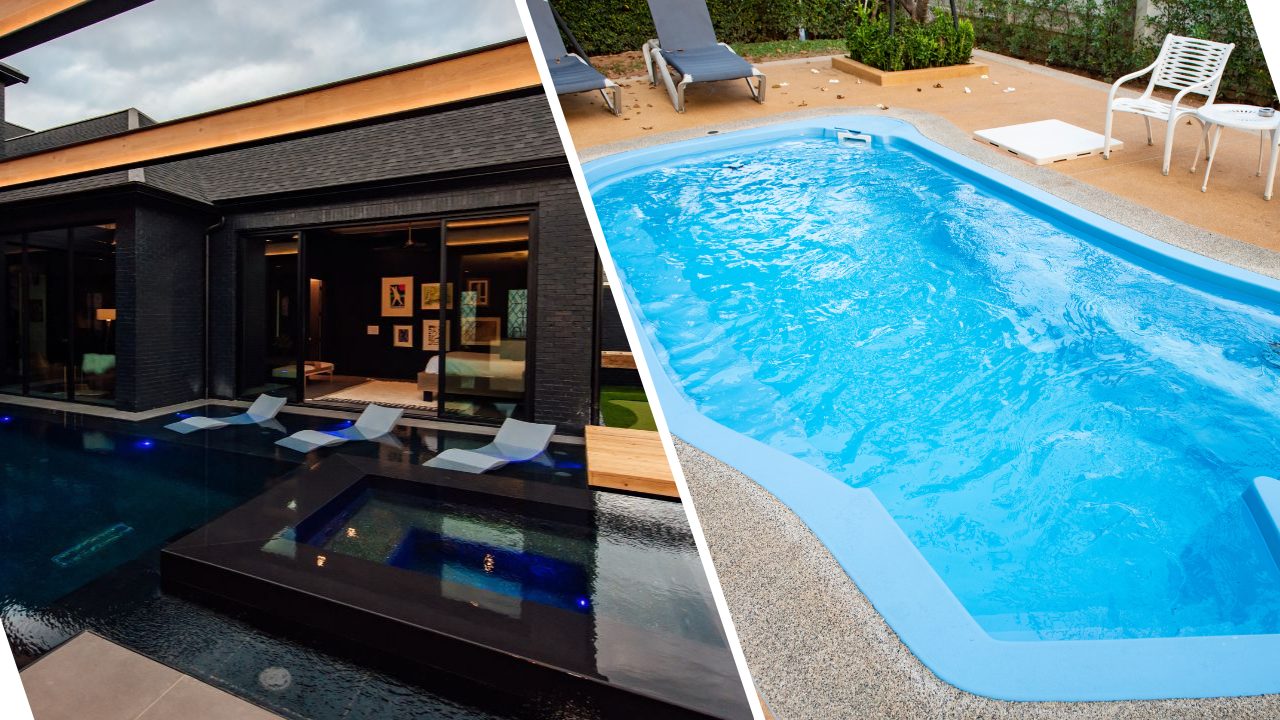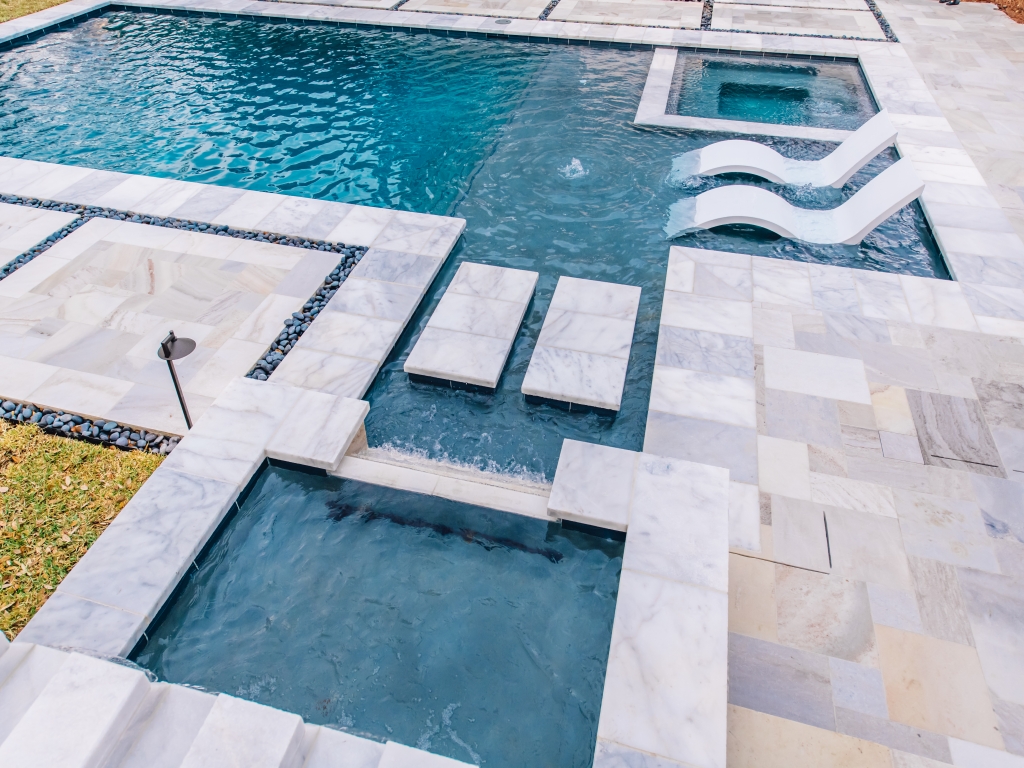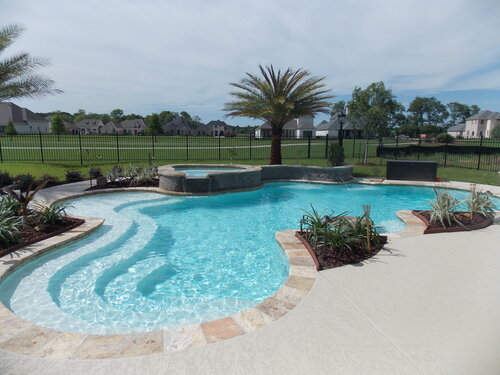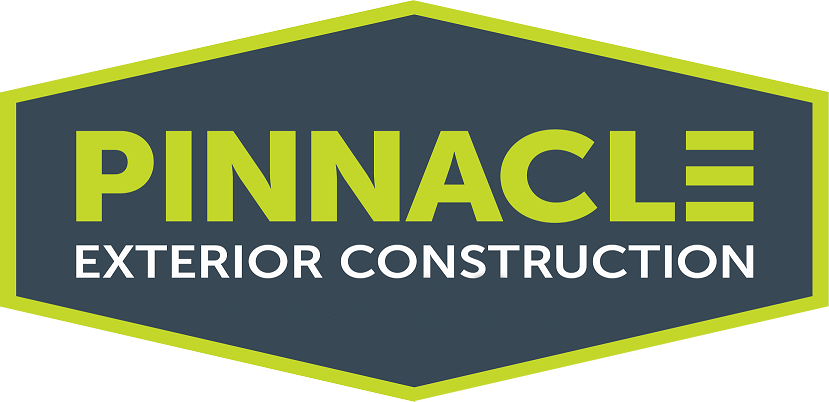Gunite vs. Fiberglass Pools: Which is Right for You?

Gunite vs. Fiberglass Pools: Choosing Which One is Right for You?
Transforming your backyard into a personal retreat is a dream for many homeowners. By choosing the right type of pool, you can significantly enhance the beauty and functionality of your outdoor space. Choosing between a gunite pool and a fiberglass pool depends on what fits your lifestyle and the look you want for your backyard.
Each type has its benefits. Gunite pools are great for those who want a custom design and elegant appearance. They can be shaped and styled in many ways to match your home’s decor. Check out our blog on the latest trends in custom pool features for 2025.
On the other hand, fiberglass pools offer a modern and sleek look with simpler installation and less maintenance. When deciding, you’ll need to consider several important factors such as the cost, how much upkeep is required, how long the pool will last, and how it will look. These considerations will help you pick the best pool type for your home.
When it comes to choosing the material for your pool, gunite and fiberglass emerge as two of the most popular options: gunite and fiberglass pools. Each material offers distinct advantages and potential drawbacks. Each comes with its own set of advantages and drawbacks. In this blog, we’ll delve into the differences between gunite and fiberglass pools to help you decide which is the best fit for your backyard oasis.
What is Gunite?
Gunite pools are constructed using a specialized method that involves spraying a mixture of cement, sand, and water through a high-pressure hose. This process creates a thick, robust concrete layer that serves as the shell of the pool.
Once the gunite material hardens and cures, which usually takes a few days, the surface is then finished with plaster, paint, or a special sealant that makes it waterproof. Additionally, for an extra touch of customization and aesthetic appeal, the surface can be decorated with tiles or stones.
Before a gunite pool can be created, a strong metal frame made of steel rebar is set up in the dug-out area that marks where the pool will go. This metal frame gives the pool its strength and helps the gunite, a type of concrete, stick to the structure properly. This method not only makes the pool more durable but also allows for a lot of flexibility in design.
You can choose from a variety of shapes and sizes to match exactly what you want and need for your backyard. This flexibility means your pool can be uniquely designed to suit your style and preferences.
Pros of Gunite Pools
Customizability: Gunite pools can be shaped in virtually any design, making them ideal for custom projects.
Durability: These pools are known for their durability and can last for decades if properly maintained.
Aesthetic Flexibility: Owners can choose from a variety of finishes to match their home and landscape.
Cons of Gunite Pools
Higher Cost: Gunite pools are generally more expensive due to their labor-intensive construction.
Maintenance Intensive: They require more upkeep than fiberglass, including more frequent acid washing and resurfacing.
Longer Construction Time: Building a gunite pool can take several weeks to months.


What is Fiberglass?
Fiberglass pools are pre-made in a factory into large, bowl-like shapes using a strong material called fiberglass-reinforced plastic. This material is then coated with a special gel that makes the pool’s surface smooth and prevents algae growth by keeping it non-porous.
When it’s time to install the pool, it’s simply placed into a hole that has already been dug in your backyard. This method is much faster than building a gunite pool, which is constructed on-site, because most of the work is done beforehand in the factory.
Pros of Fiberglass Pools
Ease of Installation: Fiberglass pools are much quicker to install, often just a few days.
Low Maintenance: The gel coat surface is durable and resistant to algae, reducing the need for chemicals and cleaning.
Longevity and Durability: Fiberglass is resistant to staining and cracking and can also last many years..
Cons of Fiberglass Pools
Limited Designs: Fiberglass pools come in pre-formed shapes and sizes, which limits customizing the design.
Size Limitations: The size and shape are restricted to what can be transported on a road.
Initial Cost: While generally cheaper than gunite, the upfront cost can still be significant.
Gunite vs. Fiberglass Pools: Key Factors to Consider
The choice between gunite and fiberglass pools depends on several factors:
Budget: The initial cost of installing a swimming pool can vary widely depending on the materials used, size, and additional features. Generally, fiberglass pools tend to be more cost-effective in terms of initial installation. The average cost of a fiberglass pool ranges from $20,000 to $60,000, while gunite pools can start at $30,000 and go up to $100,000 or more. The higher cost of gunite pools is often due to the labor-intensive installation process and the materials required.
Durability: Gunite pools are highly durable and can last for decades if maintained properly. Their robust structure allows for greater flexibility in design but requires a re-plastering every 10 to 15 years. Fiberglass pools are also durable but can be susceptible to cracking in climates with severe freeze-thaw cycles. However, they do not require resurfacing like gunite pools.
Maintenance: Fiberglass pools have a smooth, non-porous gel-coat finish, making them resistant to algae growth and easier to clean. They typically require fewer chemicals and less maintenance than gunite pools. Gunite pools, with their porous plaster finish, can harbor algae and require more frequent cleaning and chemical treatments.
Installation Time: The installation time is a crucial factor for many homeowners. Fiberglass pools offer a quicker installation, usually completed within a few days to weeks, because the shell arrives pre-made. In contrast, gunite pools are built on-site and require a curing time for the concrete, extending the installation period to several weeks or even months.
Customization: Customization is a significant advantage of gunite pools. They can be designed in any shape, size, or depth and can include custom features like vanishing edges, tanning ledges, and built-in seating. Fiberglass pools, while offering some flexibility in design, are limited to pre-manufactured shapes and sizes, which can be a drawback for those seeking a unique pool design.
Aesthetic Appeal: Both gunite and fiberglass pools can be visually stunning. Gunite pools can be finished with a variety of materials such as tiles, pebbles, or custom plaster colors, allowing for a high degree of aesthetic refinement. Fiberglass pools, while somewhat limited in terms of finish and color, have improved significantly and now come in various styles and hues.
Long-term Investment: Considering the long-term investment, gunite pools offer a solid return due to their durability and the added value to your property. While fiberglass pools are also a good investment, the perception of their value can vary based on market preferences and regional popularity.
Environmental Considerations: Environmental impact is increasingly a concern for homeowners. Fiberglass pools have a smaller carbon footprint during production compared to gunite pools, which require a significant amount of concrete and steel. However, the longevity and maintenance requirements of gunite pools might offset their initial environmental impact over time.
Which Pool is Right for You? Gunite vs. Fiberglass Pools
Choosing between a gunite and fiberglass pool comes down to your specific needs, budget, and preferences. If you value quick installation and lower maintenance, fiberglass might be the way to go. However, if you are looking for durability, customization, and long-term value, gunite could be the better choice.
Both options offer years of enjoyment and an excellent way to enhance your home’s outdoor space.
Whether you choose gunite or fiberglass, both types of pools can provide years of enjoyment and improve the quality of life. Consider your specific needs, consult with professionals, and choose the option that best suits your lifestyle and home aesthetics. Happy swimming!
